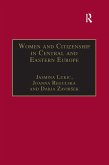The Routledge Handbook of Gender in Central-Eastern Europe and Eurasia
Herausgeber: Fábián, Katalin; Lazda, Mara; Johnson, Janet Elise
The Routledge Handbook of Gender in Central-Eastern Europe and Eurasia
Herausgeber: Fábián, Katalin; Lazda, Mara; Johnson, Janet Elise
- Gebundenes Buch
- Merkliste
- Auf die Merkliste
- Bewerten Bewerten
- Teilen
- Produkt teilen
- Produkterinnerung
- Produkterinnerung
A key reference for contemporary historical and political approaches to gender in Central-Eastern Europe and Eurasia. Leading scholars examine the region's highly diverse politics, histories, cultures, ethnicities, and religions, and how these structures intersect with gender alongside class, sexuality, coloniality, and racism.
Andere Kunden interessierten sich auch für
![Gender and Identity in Central and Eastern Europe Gender and Identity in Central and Eastern Europe]() Gender and Identity in Central and Eastern Europe72,99 €
Gender and Identity in Central and Eastern Europe72,99 €![Gender regimes in transition in Central and Eastern Europe Gender regimes in transition in Central and Eastern Europe]() Gillian PascallGender regimes in transition in Central and Eastern Europe42,99 €
Gillian PascallGender regimes in transition in Central and Eastern Europe42,99 €![Social Media and Politics in Central and Eastern Europe Social Media and Politics in Central and Eastern Europe]() Social Media and Politics in Central and Eastern Europe239,99 €
Social Media and Politics in Central and Eastern Europe239,99 €![Population Ageing in Central and Eastern Europe Population Ageing in Central and Eastern Europe]() Population Ageing in Central and Eastern Europe68,99 €
Population Ageing in Central and Eastern Europe68,99 €![Women and Citizenship in Central and Eastern Europe Women and Citizenship in Central and Eastern Europe]() Joanna RegulskaWomen and Citizenship in Central and Eastern Europe59,99 €
Joanna RegulskaWomen and Citizenship in Central and Eastern Europe59,99 €![Understanding Energy Security in Central and Eastern Europe Understanding Energy Security in Central and Eastern Europe]() Understanding Energy Security in Central and Eastern Europe190,99 €
Understanding Energy Security in Central and Eastern Europe190,99 €![Population Ageing in Central and Eastern Europe Population Ageing in Central and Eastern Europe]() Population Ageing in Central and Eastern Europe190,99 €
Population Ageing in Central and Eastern Europe190,99 €-
-
-
A key reference for contemporary historical and political approaches to gender in Central-Eastern Europe and Eurasia. Leading scholars examine the region's highly diverse politics, histories, cultures, ethnicities, and religions, and how these structures intersect with gender alongside class, sexuality, coloniality, and racism.
Produktdetails
- Produktdetails
- Verlag: Routledge
- Seitenzahl: 588
- Erscheinungstermin: 26. Juli 2021
- Englisch
- Abmessung: 260mm x 183mm x 36mm
- Gewicht: 1286g
- ISBN-13: 9781138347755
- ISBN-10: 1138347752
- Artikelnr.: 59991433
- Herstellerkennzeichnung
- Libri GmbH
- Europaallee 1
- 36244 Bad Hersfeld
- gpsr@libri.de
- Verlag: Routledge
- Seitenzahl: 588
- Erscheinungstermin: 26. Juli 2021
- Englisch
- Abmessung: 260mm x 183mm x 36mm
- Gewicht: 1286g
- ISBN-13: 9781138347755
- ISBN-10: 1138347752
- Artikelnr.: 59991433
- Herstellerkennzeichnung
- Libri GmbH
- Europaallee 1
- 36244 Bad Hersfeld
- gpsr@libri.de
Katalin Fábián is Professor of Government and Law at Lafayette College, Easton, Pennsylvaniam, USA. She edited Globalization: Perspectives from Central and Eastern Europe (2007) and served as the editor of the journal Canadian-American Slavic Studies that focused on the changing international relations of Central and Eastern Europe. Her book Contemporary Women's Movements in Hungary: Globalization, Democracy, and Gender Equality (2009) analyzes the political significance of women's activism in Hungary. She contributed chapters to and edited Domestic Violence in Postcommunist States: Local Activism, National Policies, and Global Forces (2010). With Ioana Vlad, she edited Democratization through Social Activism: Gender and Environmental Issues in Post-Communist Societies (2015). With El¿bieta Korolczuk, she edited and wrote chapters that appeared in Rebellious Parents: Parents' Movements in Central-Eastern Europe and Russia (2017). Janet Elise Johnson is Professor of Political Science at Brooklyn College, City University of New York, Bronx, USA. Her books include The Gender of Informal Politics (2018), Gender Violence in Russia (2009), and Living Gender after Communism (with Jean C. Robinson, 2007). In the last few years, she has published articles in Slavic Review, Human Rights Review, Journal of Social Policy Studies, Politics & Gender, Perspectives on Politics, Journal of Social Policy, and Aspasia: The International Yearbook of Central, Eastern, and Southeastern European Women's and Gender History as well as online in The New Yorker, The Washington Post's Monkey Cage, and The Boston Review. From 2008-2019, she was one of the coordinators of the monthly workshop on Gender and Transformation: Women in Europe, at New York University. Mara Lazda is Associate Professor of History at Bronx Community College, City University of Brooklyn, New York, USA. Her regional focus is on Latvia, with broader research interests on the intersections between gender, nationalism, and transnationalism in historical and contemporary contexts. Her articles have appeared in the Journal of Baltic Studies, the International Journal of Politics, Culture, and Society, and Nationalities Papers. She has served as the President of the Association of Baltic Studies (2014-2016), a coordinator of the Gender and Transformation: Women in Europe workshop at New York University, and an editor for Aspasia: The International Yearbook of Central, Eastern, and Southeastern European Women's and Gender History.
Part 1: Conceptual Debates and Methodological Differences
Introduction
The Development of the Field
Chapter 1: Between Regional and Transnational Contexts
Chapter 2: Fluidity or Clean Breaks?
Chapter 3: Neoliberal Intervention: Analyzing the Drakuli¿-Funk-Ghodsee Debates
Methodologies
Chapter 4: Legacies of the Cold War and the Future of Gender in Feminist Histories of Socialism
Chapter 5: The Case and Comparative Methods
Chapter 6: Quantitative and Experimental Methods
Epistemologies
Chapter 7: Postcoloniality in Central-Eastern Europe and Eurasia
Chapter 8: Post-Soviet Masculinities: Sex, Power, and the Vanishing Subject
Part 2 Feminist and Women's Movements Cooperating and Colliding
Introduction
Women's Organizing under Empires
Chapter 9: Challenging Tradition and Crossing Borders: Women's Activism and Literary Modernism in the Austro-Hungarian Monarchy
Chapter 10: The First All-Russian Women's Congress: "The Women's Parliament"
Socialist (Feminist) Interpretations
Chapter 11: The Russian Revolution and Women's Liberation: Rethinking the Legacy of the Socialist Emancipation Project
Dissident Women and Feminisms
Chapter 12: Czechoslovak Feminisms during the Interwar Period
Chapter 13: Women in Poland's Solidarity
Postcommunist NGO Feminisms and Beyond
Chapter 14: From Soviet Feminism to the European Union: Transnational Women's Movements between East and West
Chapter 15: Transnational Feminism and Women's NGOs: The Case of the Network of East-West Women
Chapter 16: Contentions of Funding Gender Equality in Central-Eastern Europe
Chapter 17: Pussy Riot and FEMEN's Global Trajectories in Law, Society, and Culture
Part 3 Constructions of Gender in Different Ideologies
Introduction
Mara Lazda, Janet Elise Johnson, and Katalin Fábián
Nationalism
Chapter 18: Nationalism and Sexuality in Central-Eastern Europe
Chapter 19: Gender, Militarism, and the Modern Nation in Soviet and Russian cultures
Fascism
Chapter 20: Far-Right Expectations of Women in Central-Eastern Europe
Socialisms and Communisms
Chapter 21: Paradoxes of Gender in Soviet Communist Party Women's Sections (the Zhenotdel), 1918-1930
Chapter 22: Women's Education, Entry to Paid Work, and Forced Unveiling in Soviet Central Asia
Chapter 23: "Gypsies"/Roma and the Politics of Reproduction in Post-Stalinist Central-Eastern Europe
Chapter 24: Legalizing Queerness in Central-Eastern Europe
Democracy
Chapter 25: Gender and the Democratic Paradox in Latvia
Chapter 26: Anti-Gender Mobilization and Right-Wing Populism
Part 4 Lived Experience of the Individual in Different Regimes
Introduction
Empires and Monarchies
Chapter 27: Late Imperial Russia and Its Gendered Order in the Countryside
Chapter 28: Gendered Moral Panics in the Late Habsburg Monarchy: Prostitution, Sex Trafficking, and Venereal Disease
Nancy Wingfield
Independence
Chapter 29: The Promise of Gender Equality in Interwar Central-Eastern Europe
Nazism, Stalinism, and War
Chapter 30: Sexuality in the Holocaust
Chapter 31: Deportation and Gulag as Gendered Processes
Socialisms and Communisms
Chapter 32: Yugoslav Gender Experiments and Soviet Influences
Chapter 33: Struggles to Reconcile Women's Wage Labor and Kitchen Labor in the German Democratic Republic
Part 5 The Ambiguous Postcommunist Transitions
Introduction
Democratic and Economic Changes
Chapter 34: Gender and the Ambiguities of Economic Transition in Romania
Chapter 35: Democratization, Authoritarianism, and Gender in Russia
Europeanization
Chapter 36: Europeanization and the Challenge of Gender Equality
Chapter 37: The Europeanization and Politicization of LGBT Rights in Serbia
Migrations
Chapter 38: Russian-Speaking LGBTQ Communities in the West
Chapter 39: Postsocialist Migration and Intimacy
Armed Conflict/Resolution
Chapter 40: The International Criminal Tribunal for former Yugoslavia and the Development of Legal Frameworks on Violence against Women in Conflict
Chapter 41: Gender, Conflict, and Social Change in Armenia and Azerbaijan
Part 6 Postcommunist Policy Issues
Introduction
Political Leadership
Chapter 42: Women's Representation in Politics
Gender-based Violence
Chapter 43: Hybrid Regimes and Gender Violence Prevention Campaigns in Ukraine
Chapter 44: Bride Kidnapping and Polygynous Marriages: Gendered Debates in Central Asia
Chapter 45: Trafficked Women and Men to and from Russia
Reproductive Rights
Chapter 46: Assisted Reproduction: Poland in a Comparative Perspective
Chapter 47: Abortion and Reproductive Health in Eurasia: Continuity and Change
Social Policy and Health
Chapter 48: Single Mothers, Family Change, and Normalized Gender Crisis in Russia
Chapter 49 Social Welfare and Family Policies in Central-Eastern European Countries
Chapter 50: Women's Representation in Sports
Chapter 51: Gender, Sexuality, and Disability in Postsocialist Central-Eastern Europe
Introduction
The Development of the Field
Chapter 1: Between Regional and Transnational Contexts
Chapter 2: Fluidity or Clean Breaks?
Chapter 3: Neoliberal Intervention: Analyzing the Drakuli¿-Funk-Ghodsee Debates
Methodologies
Chapter 4: Legacies of the Cold War and the Future of Gender in Feminist Histories of Socialism
Chapter 5: The Case and Comparative Methods
Chapter 6: Quantitative and Experimental Methods
Epistemologies
Chapter 7: Postcoloniality in Central-Eastern Europe and Eurasia
Chapter 8: Post-Soviet Masculinities: Sex, Power, and the Vanishing Subject
Part 2 Feminist and Women's Movements Cooperating and Colliding
Introduction
Women's Organizing under Empires
Chapter 9: Challenging Tradition and Crossing Borders: Women's Activism and Literary Modernism in the Austro-Hungarian Monarchy
Chapter 10: The First All-Russian Women's Congress: "The Women's Parliament"
Socialist (Feminist) Interpretations
Chapter 11: The Russian Revolution and Women's Liberation: Rethinking the Legacy of the Socialist Emancipation Project
Dissident Women and Feminisms
Chapter 12: Czechoslovak Feminisms during the Interwar Period
Chapter 13: Women in Poland's Solidarity
Postcommunist NGO Feminisms and Beyond
Chapter 14: From Soviet Feminism to the European Union: Transnational Women's Movements between East and West
Chapter 15: Transnational Feminism and Women's NGOs: The Case of the Network of East-West Women
Chapter 16: Contentions of Funding Gender Equality in Central-Eastern Europe
Chapter 17: Pussy Riot and FEMEN's Global Trajectories in Law, Society, and Culture
Part 3 Constructions of Gender in Different Ideologies
Introduction
Mara Lazda, Janet Elise Johnson, and Katalin Fábián
Nationalism
Chapter 18: Nationalism and Sexuality in Central-Eastern Europe
Chapter 19: Gender, Militarism, and the Modern Nation in Soviet and Russian cultures
Fascism
Chapter 20: Far-Right Expectations of Women in Central-Eastern Europe
Socialisms and Communisms
Chapter 21: Paradoxes of Gender in Soviet Communist Party Women's Sections (the Zhenotdel), 1918-1930
Chapter 22: Women's Education, Entry to Paid Work, and Forced Unveiling in Soviet Central Asia
Chapter 23: "Gypsies"/Roma and the Politics of Reproduction in Post-Stalinist Central-Eastern Europe
Chapter 24: Legalizing Queerness in Central-Eastern Europe
Democracy
Chapter 25: Gender and the Democratic Paradox in Latvia
Chapter 26: Anti-Gender Mobilization and Right-Wing Populism
Part 4 Lived Experience of the Individual in Different Regimes
Introduction
Empires and Monarchies
Chapter 27: Late Imperial Russia and Its Gendered Order in the Countryside
Chapter 28: Gendered Moral Panics in the Late Habsburg Monarchy: Prostitution, Sex Trafficking, and Venereal Disease
Nancy Wingfield
Independence
Chapter 29: The Promise of Gender Equality in Interwar Central-Eastern Europe
Nazism, Stalinism, and War
Chapter 30: Sexuality in the Holocaust
Chapter 31: Deportation and Gulag as Gendered Processes
Socialisms and Communisms
Chapter 32: Yugoslav Gender Experiments and Soviet Influences
Chapter 33: Struggles to Reconcile Women's Wage Labor and Kitchen Labor in the German Democratic Republic
Part 5 The Ambiguous Postcommunist Transitions
Introduction
Democratic and Economic Changes
Chapter 34: Gender and the Ambiguities of Economic Transition in Romania
Chapter 35: Democratization, Authoritarianism, and Gender in Russia
Europeanization
Chapter 36: Europeanization and the Challenge of Gender Equality
Chapter 37: The Europeanization and Politicization of LGBT Rights in Serbia
Migrations
Chapter 38: Russian-Speaking LGBTQ Communities in the West
Chapter 39: Postsocialist Migration and Intimacy
Armed Conflict/Resolution
Chapter 40: The International Criminal Tribunal for former Yugoslavia and the Development of Legal Frameworks on Violence against Women in Conflict
Chapter 41: Gender, Conflict, and Social Change in Armenia and Azerbaijan
Part 6 Postcommunist Policy Issues
Introduction
Political Leadership
Chapter 42: Women's Representation in Politics
Gender-based Violence
Chapter 43: Hybrid Regimes and Gender Violence Prevention Campaigns in Ukraine
Chapter 44: Bride Kidnapping and Polygynous Marriages: Gendered Debates in Central Asia
Chapter 45: Trafficked Women and Men to and from Russia
Reproductive Rights
Chapter 46: Assisted Reproduction: Poland in a Comparative Perspective
Chapter 47: Abortion and Reproductive Health in Eurasia: Continuity and Change
Social Policy and Health
Chapter 48: Single Mothers, Family Change, and Normalized Gender Crisis in Russia
Chapter 49 Social Welfare and Family Policies in Central-Eastern European Countries
Chapter 50: Women's Representation in Sports
Chapter 51: Gender, Sexuality, and Disability in Postsocialist Central-Eastern Europe
Part 1: Conceptual Debates and Methodological Differences
Introduction
The Development of the Field
Chapter 1: Between Regional and Transnational Contexts
Chapter 2: Fluidity or Clean Breaks?
Chapter 3: Neoliberal Intervention: Analyzing the Drakuli¿-Funk-Ghodsee Debates
Methodologies
Chapter 4: Legacies of the Cold War and the Future of Gender in Feminist Histories of Socialism
Chapter 5: The Case and Comparative Methods
Chapter 6: Quantitative and Experimental Methods
Epistemologies
Chapter 7: Postcoloniality in Central-Eastern Europe and Eurasia
Chapter 8: Post-Soviet Masculinities: Sex, Power, and the Vanishing Subject
Part 2 Feminist and Women's Movements Cooperating and Colliding
Introduction
Women's Organizing under Empires
Chapter 9: Challenging Tradition and Crossing Borders: Women's Activism and Literary Modernism in the Austro-Hungarian Monarchy
Chapter 10: The First All-Russian Women's Congress: "The Women's Parliament"
Socialist (Feminist) Interpretations
Chapter 11: The Russian Revolution and Women's Liberation: Rethinking the Legacy of the Socialist Emancipation Project
Dissident Women and Feminisms
Chapter 12: Czechoslovak Feminisms during the Interwar Period
Chapter 13: Women in Poland's Solidarity
Postcommunist NGO Feminisms and Beyond
Chapter 14: From Soviet Feminism to the European Union: Transnational Women's Movements between East and West
Chapter 15: Transnational Feminism and Women's NGOs: The Case of the Network of East-West Women
Chapter 16: Contentions of Funding Gender Equality in Central-Eastern Europe
Chapter 17: Pussy Riot and FEMEN's Global Trajectories in Law, Society, and Culture
Part 3 Constructions of Gender in Different Ideologies
Introduction
Mara Lazda, Janet Elise Johnson, and Katalin Fábián
Nationalism
Chapter 18: Nationalism and Sexuality in Central-Eastern Europe
Chapter 19: Gender, Militarism, and the Modern Nation in Soviet and Russian cultures
Fascism
Chapter 20: Far-Right Expectations of Women in Central-Eastern Europe
Socialisms and Communisms
Chapter 21: Paradoxes of Gender in Soviet Communist Party Women's Sections (the Zhenotdel), 1918-1930
Chapter 22: Women's Education, Entry to Paid Work, and Forced Unveiling in Soviet Central Asia
Chapter 23: "Gypsies"/Roma and the Politics of Reproduction in Post-Stalinist Central-Eastern Europe
Chapter 24: Legalizing Queerness in Central-Eastern Europe
Democracy
Chapter 25: Gender and the Democratic Paradox in Latvia
Chapter 26: Anti-Gender Mobilization and Right-Wing Populism
Part 4 Lived Experience of the Individual in Different Regimes
Introduction
Empires and Monarchies
Chapter 27: Late Imperial Russia and Its Gendered Order in the Countryside
Chapter 28: Gendered Moral Panics in the Late Habsburg Monarchy: Prostitution, Sex Trafficking, and Venereal Disease
Nancy Wingfield
Independence
Chapter 29: The Promise of Gender Equality in Interwar Central-Eastern Europe
Nazism, Stalinism, and War
Chapter 30: Sexuality in the Holocaust
Chapter 31: Deportation and Gulag as Gendered Processes
Socialisms and Communisms
Chapter 32: Yugoslav Gender Experiments and Soviet Influences
Chapter 33: Struggles to Reconcile Women's Wage Labor and Kitchen Labor in the German Democratic Republic
Part 5 The Ambiguous Postcommunist Transitions
Introduction
Democratic and Economic Changes
Chapter 34: Gender and the Ambiguities of Economic Transition in Romania
Chapter 35: Democratization, Authoritarianism, and Gender in Russia
Europeanization
Chapter 36: Europeanization and the Challenge of Gender Equality
Chapter 37: The Europeanization and Politicization of LGBT Rights in Serbia
Migrations
Chapter 38: Russian-Speaking LGBTQ Communities in the West
Chapter 39: Postsocialist Migration and Intimacy
Armed Conflict/Resolution
Chapter 40: The International Criminal Tribunal for former Yugoslavia and the Development of Legal Frameworks on Violence against Women in Conflict
Chapter 41: Gender, Conflict, and Social Change in Armenia and Azerbaijan
Part 6 Postcommunist Policy Issues
Introduction
Political Leadership
Chapter 42: Women's Representation in Politics
Gender-based Violence
Chapter 43: Hybrid Regimes and Gender Violence Prevention Campaigns in Ukraine
Chapter 44: Bride Kidnapping and Polygynous Marriages: Gendered Debates in Central Asia
Chapter 45: Trafficked Women and Men to and from Russia
Reproductive Rights
Chapter 46: Assisted Reproduction: Poland in a Comparative Perspective
Chapter 47: Abortion and Reproductive Health in Eurasia: Continuity and Change
Social Policy and Health
Chapter 48: Single Mothers, Family Change, and Normalized Gender Crisis in Russia
Chapter 49 Social Welfare and Family Policies in Central-Eastern European Countries
Chapter 50: Women's Representation in Sports
Chapter 51: Gender, Sexuality, and Disability in Postsocialist Central-Eastern Europe
Introduction
The Development of the Field
Chapter 1: Between Regional and Transnational Contexts
Chapter 2: Fluidity or Clean Breaks?
Chapter 3: Neoliberal Intervention: Analyzing the Drakuli¿-Funk-Ghodsee Debates
Methodologies
Chapter 4: Legacies of the Cold War and the Future of Gender in Feminist Histories of Socialism
Chapter 5: The Case and Comparative Methods
Chapter 6: Quantitative and Experimental Methods
Epistemologies
Chapter 7: Postcoloniality in Central-Eastern Europe and Eurasia
Chapter 8: Post-Soviet Masculinities: Sex, Power, and the Vanishing Subject
Part 2 Feminist and Women's Movements Cooperating and Colliding
Introduction
Women's Organizing under Empires
Chapter 9: Challenging Tradition and Crossing Borders: Women's Activism and Literary Modernism in the Austro-Hungarian Monarchy
Chapter 10: The First All-Russian Women's Congress: "The Women's Parliament"
Socialist (Feminist) Interpretations
Chapter 11: The Russian Revolution and Women's Liberation: Rethinking the Legacy of the Socialist Emancipation Project
Dissident Women and Feminisms
Chapter 12: Czechoslovak Feminisms during the Interwar Period
Chapter 13: Women in Poland's Solidarity
Postcommunist NGO Feminisms and Beyond
Chapter 14: From Soviet Feminism to the European Union: Transnational Women's Movements between East and West
Chapter 15: Transnational Feminism and Women's NGOs: The Case of the Network of East-West Women
Chapter 16: Contentions of Funding Gender Equality in Central-Eastern Europe
Chapter 17: Pussy Riot and FEMEN's Global Trajectories in Law, Society, and Culture
Part 3 Constructions of Gender in Different Ideologies
Introduction
Mara Lazda, Janet Elise Johnson, and Katalin Fábián
Nationalism
Chapter 18: Nationalism and Sexuality in Central-Eastern Europe
Chapter 19: Gender, Militarism, and the Modern Nation in Soviet and Russian cultures
Fascism
Chapter 20: Far-Right Expectations of Women in Central-Eastern Europe
Socialisms and Communisms
Chapter 21: Paradoxes of Gender in Soviet Communist Party Women's Sections (the Zhenotdel), 1918-1930
Chapter 22: Women's Education, Entry to Paid Work, and Forced Unveiling in Soviet Central Asia
Chapter 23: "Gypsies"/Roma and the Politics of Reproduction in Post-Stalinist Central-Eastern Europe
Chapter 24: Legalizing Queerness in Central-Eastern Europe
Democracy
Chapter 25: Gender and the Democratic Paradox in Latvia
Chapter 26: Anti-Gender Mobilization and Right-Wing Populism
Part 4 Lived Experience of the Individual in Different Regimes
Introduction
Empires and Monarchies
Chapter 27: Late Imperial Russia and Its Gendered Order in the Countryside
Chapter 28: Gendered Moral Panics in the Late Habsburg Monarchy: Prostitution, Sex Trafficking, and Venereal Disease
Nancy Wingfield
Independence
Chapter 29: The Promise of Gender Equality in Interwar Central-Eastern Europe
Nazism, Stalinism, and War
Chapter 30: Sexuality in the Holocaust
Chapter 31: Deportation and Gulag as Gendered Processes
Socialisms and Communisms
Chapter 32: Yugoslav Gender Experiments and Soviet Influences
Chapter 33: Struggles to Reconcile Women's Wage Labor and Kitchen Labor in the German Democratic Republic
Part 5 The Ambiguous Postcommunist Transitions
Introduction
Democratic and Economic Changes
Chapter 34: Gender and the Ambiguities of Economic Transition in Romania
Chapter 35: Democratization, Authoritarianism, and Gender in Russia
Europeanization
Chapter 36: Europeanization and the Challenge of Gender Equality
Chapter 37: The Europeanization and Politicization of LGBT Rights in Serbia
Migrations
Chapter 38: Russian-Speaking LGBTQ Communities in the West
Chapter 39: Postsocialist Migration and Intimacy
Armed Conflict/Resolution
Chapter 40: The International Criminal Tribunal for former Yugoslavia and the Development of Legal Frameworks on Violence against Women in Conflict
Chapter 41: Gender, Conflict, and Social Change in Armenia and Azerbaijan
Part 6 Postcommunist Policy Issues
Introduction
Political Leadership
Chapter 42: Women's Representation in Politics
Gender-based Violence
Chapter 43: Hybrid Regimes and Gender Violence Prevention Campaigns in Ukraine
Chapter 44: Bride Kidnapping and Polygynous Marriages: Gendered Debates in Central Asia
Chapter 45: Trafficked Women and Men to and from Russia
Reproductive Rights
Chapter 46: Assisted Reproduction: Poland in a Comparative Perspective
Chapter 47: Abortion and Reproductive Health in Eurasia: Continuity and Change
Social Policy and Health
Chapter 48: Single Mothers, Family Change, and Normalized Gender Crisis in Russia
Chapter 49 Social Welfare and Family Policies in Central-Eastern European Countries
Chapter 50: Women's Representation in Sports
Chapter 51: Gender, Sexuality, and Disability in Postsocialist Central-Eastern Europe








